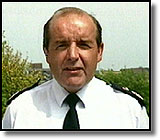
|
Police Chief Calls for New Drugs PolicyOne of Britain's most senior police officers has called for a fundamental rethink of the Government's anti-drug strategy.Writing in The Guardian, Michael O'Byrne, the chief constable of Bedfordshire, emphasises that legalisation and regulation similar to alcohol will have to be considered if a new drugs policy is not drawn up. He writes: "If we continue to do only what we do already, we are not likely to contain, never mind reduce, the amount of drug-taking."
Mr O'Byrne argues that education and treatment are essential in reducing the demand for drugs. He strongly criticises the lack of research into what forms of treatment work, arguing that treatment centres are "low on the budget list". The chief constable says that the current practice of cautioning for possession of drugs has effectively decriminalising the use of drugs. He advocates a new stance, so that the consumption of drugs is regarded as a crime. This would involve the creation of drug courts, which would deal only with drug offenders. Judges and mgistrates at such courts would have a detailed knowledge of the drugs scene and the options available - including treatment - for offenders. Mr O'Byrne adds that there should be a presumption that anyone holding more than a cewrtain quantity of drugs should be regarded as a trafficker. The onus should be on defendents to prove that they are not involved in trafficking. Mr O'Byrne criticises the current situation, "with its rag-bag of schemes grabbed from goodness knows where (usually America), implemented by a variety of agencies with differing levels of expertise." The chief constable's remarks are certain to fuel the debate over drugs. Mike Goodman, of the drugs charity Release, said: "Mr O'Byrne's willingness to look at new ideas and think the unthinkable is welcome."
|
Diana, Princess of Wales, 1961-1997
Conference 97
Devolution
The Archive
News |
Issues |
Background |
Parties |
Analysis |
TV/Radio/Web
Interactive |
Forum |
Live |
About This Site
News |
Issues |
Background |
Parties |
Analysis |
TV/Radio/Web
Interactive |
Forum |
Live |
About This Site
© BBC 1997 |
politics97@bbc.co.uk |

